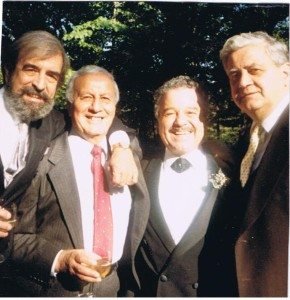By Charles Kasbarian
My first glimpse of Armen Babamian was in 1931 when I was four years old. My mother had enrolled my older brother and me in the Sunday School of Holy Cross Armenian Apostolic Church in Union City, N.J. At a certain point our teachers would take us into the sanctuary to witness the Armenian Liturgy that was under way. It was then that I saw Armen, standing on the altar, book in hand, singing one of our timeless and beloved sharagans. I felt exalted by Armen’s enchanting voice, and I resolved at that tender age to some day join the choir, which I eventually did.

By that time Armen was no longer singing in Holy Cross Church, and I was grouped with the sopranos because my voice hadn’t changed yet. When it did, the choir director, Artin Shalian, an erudite scholar who later translated our Armenian epic, David of Sassoun, published by Ohio University Press, took me in hand and personally taught me the bass part of the Badarak. When later he was relieved of his duties, I decided it was time to move on.
When I next met Armen, with whom I had developed a close friendship over the years, I said to him, “Armen, I know that you are the choirmaster of St. Illuminator’s Cathedral in New York, and I’d like to come join your choir.” He replied, “I would consider it an honor to have you in my choir. As a matter of fact, we have choir rehearsal this Thursday night. Come.” So I went, and he introduced me as the newest member of the choir. He also described me as his cousin (which I wasn’t), probably counting on that to put me in the good graces of the other members. Well, it sure worked. It happened that elections were scheduled for a new executive body that very night, and, based upon Armen’s recommendation, I was elected to the executive committee. That shows how highly he was thought of by the young people who practically worshipped him. His popularity was enhanced by his habit of taking the kids after Sunday Badarak to the local ice cream parlor for a treat at his expense. They would sing on the streets, all the way, the Armenian folk songs he had taught them. Many of them joined the Armenian National Chorus, which he eventually directed.
When it came to encouraging the youth, Armen was not surpassed. Thanks to him we were blessed with some of the finest church organists to be found. This brings to mind names such as Ara Dinkjian, Laurens Ayvazian, Raffi Kadian, Antranig Kasbarian, Diane Kradjian, and Anne Boyajian. No potential candidate was too young for Armen if he thought that person had the ability to succeed. Just think, when Laurens Ayvazian left the post of organist, Armen recommended Raffi Kadian and Antranig Kasbarian as co-organists. And they were 13 and 12 years old, respectively. They fully measured up to his expectations, as did all the others.
Although Armen was 12 years my senior, he always behaved towards me as an older brother. Together with Onnik Dinkjian, we acted like the “Three Musketeers of Dikranagerd,” always speaking our dialect when in each others’ company. Armen had mentioned to me that our dear departed friend Zabelle Bogosian, when a child, had difficulty saying akhper, Dikranagerdtsi for yeghpair or brother. She would address her brother as aper, and we picked up on that, calling each other aper, or ap for short. Many a time Armen would address me with, “Hi ap, what’s up!”
Vladimir Nabokov, author of Lolita, observed, “Life is such a great surprise. There is no reason why what follows should not be an even greater surprise.” And so, we say Adieu to you, dear Armen, and look forward to when our spirits will meet again in the Great Beyond.
To hear Armen’s vocal renditions of our sacred and secular Armenian music, visit this YouTube link: http://youtu.be/XUd7tVJUxNA.


In 1965, the year of our great re-awakening, I was a young teen growing up in the Indian Orchard Armenian community. Our community decided to sponsor a genocide broadcast on the local television station. The program was to consist of a short documentary on the genocide and a “hokihankisdt” service with our Der Hayr, alter servers and choir. I was an obscure acolyte, amazed that Armenians were going to be on TV. Mr.Babamian came from N.J. to lead our choir during the taping of the program. I had heard about this renown individual from my father and how honored we were to have him that day. I remember watching from my position as an altar server how Mr.Babamian led the choir with grace, passion and such a love of our shadagans. That day was a special one for me. I still have vivid recollections of that day as if it was yesterday. His ability to inspire went beyond those in his choirs. May God bless the memory and soul of this humble servant.